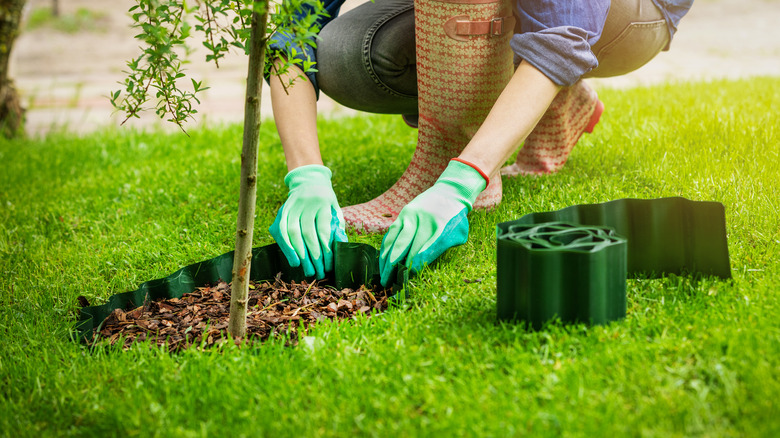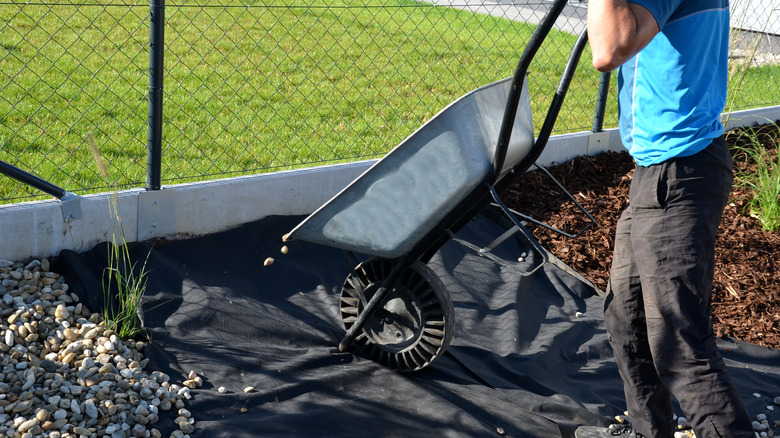TikTok's Tree Edging DIY Is Raising Questions From Some Gardeners
To keep your yard looking spick and span, you have to make sure your lawn is mowed, your flowers and hedges are in order, and the borders are all tidied up. If you have any trees in the yard, then they would also benefit from some cool TLC. When it comes to trees, a lot of gardeners prefer to edge them which is typically done when mulching. Edging your tree not only makes it presentable to the public but also provides it with a trough that will keep the mulch in and prevent it from scattering across the lawn. TikTok DIY enthusiast Bart Komar posted a video of himself edging a tree, and it's safe to say that his methods weren't appreciated by the general gardening public.
The video shows Komar digging a border around a tree in his yard with a shovel, applying topsoil, laying landscape fabric over it, and adding more soil and mulch on top. The comment section is filled with other exasperated gardeners with a lot of notes. They pointed out several things such as the soil being too high and blocking the root flare, the wrong use of landscape fabric, and the haphazard look of it all when finished. If you've been dying to give your trees some edging work and need to know what not to do straight from the forum of internet gardeners, then you can take Komar's video as a much-needed cautionary tale.
Never cover your tree's root flare
There are several dos and don'ts when it comes to tree maintenance, but one of the most important rules is to never cover the root flare. This is the visibly bulky portion at the base of the tree where the roots originate from. Great care should be taken to not heap soil over this because this is where the tree roots respire from and they need oxygen to survive. When Bart Komar covered up the root flare, he condemned the tree to suffocation.
As a precaution, as some of the users in the comments pointed out, Komar should have dug out the soil for the tree root flare further down before adding the topsoil. Instead, he poured mulch on top — a big no-no. When you are edging a tree, make sure you dig out as much soil as is needed, way beyond the root flare, so that by the time you add the mulch, it will come up just below the root flare. This will give the tree allowance to breathe and exchange gases.
Another reason why the gardeners gave the method a thumbs-down is because of the common mulching mistake of applying it too close to the tree. Ideally, you want to spread the organic material around the tree but with enough social distance, and we're talking at least 1 foot or 1.5 feet from the bark. Mulch that close will girdle the bark which would inevitably kill the tree.
Mulch over the landscape fabric ... not the best idea
One other rampant sentiment in the comment section of Bart Komar's video post is that the process of using landscape fabric was completely unnecessary and detrimental to the tree's health. While the fabric is designed to suppress the growth of weeds, a plus, the main argument is that the fabric would prevent nutrients, especially water. The landscape fabric may be permeable enough to allow water to pass through, but not before most of the liquid runs off to other areas. The drainage quality is pretty poor, also because particles such as leaves and dirt get stuck in the tiny holes of the fabric as time goes on. This will inhibit the flow of water even more. Without an adequate supply of hydration to the tree, of course, it will suffer.
Still on landscape fabrics, adding it on top of the soil was bad enough, but laying more soil and mulch over it sent some of the gardeners over the edge. Putting mulch over the landscape fabric is frowned upon because it defeats its purpose. Mulch is there for various reasons: to protect the topsoil, keep moisture in, increase the organic components of the soil, and suppress weeds. By throwing it over the fabric, you are keeping it from fully achieving its goals. A lot of the users in Komar's comments asserted that the landscape fabric in this case was useless and should be removed.

